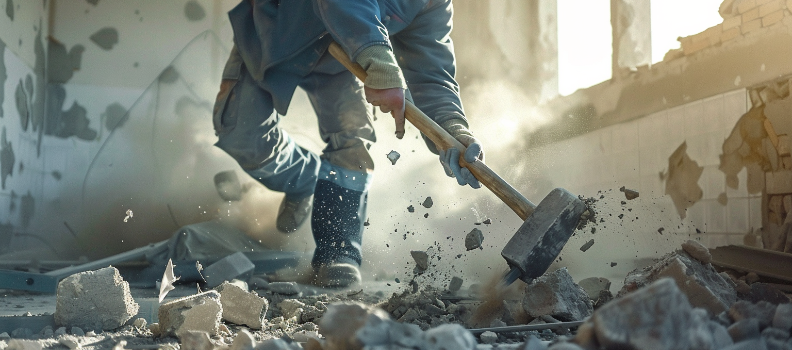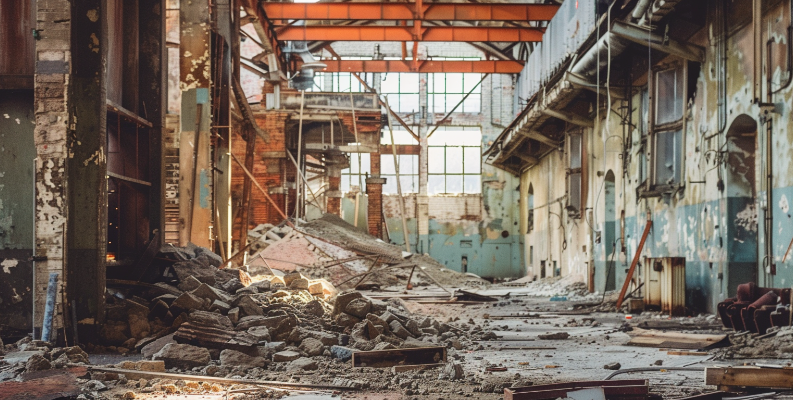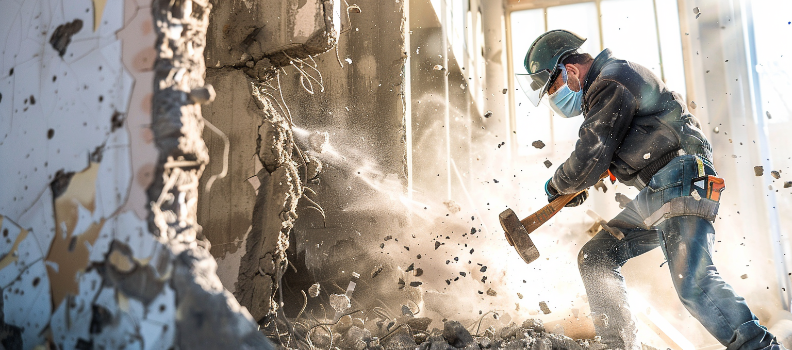Asbestos Exposure
Among Construction &
Remodeling Workers
Construction and remodeling workers historically have been on the front
lines of occupational exposure to asbestos, a material once prevalent in the building industry for its durability and fire-resistant properties.These workers, engaged in the cutting, shaping, and installation of building
materials, may have unknowingly inhaled or ingested asbestos fibers, putting them at an increased risk for a range of asbestos-related diseases.
What the research says about Construction and Remodeling Occupations and Asbestos Risk:
Asbestos exposure is common in construction-related work.

Construction workers face significant asbestos exposure risks due to the nature of their work.
Asbestos Use in the Construction Industry
Nearly every building constructed before the mid-1980s included asbestos products and building materials.

Asbestos is often associated with industrial jobs. But it was used in nearly every building constructed until the mid-1980s. Many people were exposed to asbestos insulation, wallboard, floors and ceilings, in industrial sites, as well as residences and workplaces like offices and hotels.
Buildings of all kinds constructed before the mid-1980s contained some asbestos products, including residential, commercial, and industrial structures. Asbestos was in building materials from the roof shingles and adhesive through the ceiling, walls, wiring, plumbing and insulation in the attic and basement.
Asbestos was used in a wide variety of construction products like cement, shingles, tiles, and insulation of all kinds (electrical / thermal / accustic).
Construction, remodeling, and demolition can damage and disturb asbestos-containing materials, releasing harmful asbestos fibers into the air.

Disturbing Asbestos Hazards
Anyone working or spending time around asbestos materials can potentially be exposed from construction work. Anyone who was exposed to asbestos, even in the past, should consider getting screened for asbestos damage.
Why did it take so long to ban asbestos?
Asbestos has been banned and regulated for many uses, but a great deal of legacy asbestos remains.
Despite asbestos bans, asbestos products are still in many old buildings, and can pose a risk to anyone in the building, including regular workers. Because asbestos has no taste or smell, and is often microscopic when it breaks into tiny fibers, The key is knowing what’s there – that involves testing by a licensed professional.
Tasks in Constructor and Remodeling Work Involving Asbestos Exposure
Some commonly-performed tasks include:
| Task | Description |
|---|---|
| Demolition of Structures | Tearing down walls, ceilings, or partitions that contain asbestos materials. |
| Sawing, Drilling, or Cutting into Asbestos-Containing Materials | Disturbing asbestos through these actions can release fibers into the air. |
| Removing Asbestos Insulation from Pipes and Boilers | Stripping old insulation that contains asbestos from various structures and equipment. |
| Renovating Old Buildings | Updating or modifying older structures where asbestos was used in construction materials like floor tiles, ceiling tiles, roofing, and siding. |
| Installing or Removing Ceiling Tiles and Panels | Handling older ceiling materials that contain asbestos. |
| Handling Asbestos-Containing Floor Tiles and Adhesives | Laying, repairing, or removing old vinyl or asphalt floor tiles and the adhesives used with them. |
| Repairing or Replacing Roofing and Siding Materials | Working with asbestos-containing shingles, siding, or roofing felts. |
| Applying or Removing Textured Coatings | Such as popcorn ceilings or acoustic panels that may contain asbestos. |
| Replacing Old Window Caulk or Glazing | Which might have asbestos fibers mixed into the compound. |
| Working on Fire Doors and Fireproofing Materials | Many fire doors and fire-resistant materials historically contained asbestos. |
| Dismantling Asbestos-Containing Electrical Components | Such as old fuse boxes, which may have asbestos-containing insulation. |
| Working with Plaster and Joint Compounds | Mixing, sanding, or removing these materials, which may contain asbestos in older buildings. |
| Cutting or Removing Asbestos Cement Sheets or Pipes | Used in a variety of construction applications, including siding, roofing, and sewer piping. |
| Installing, Repairing, or Removing HVAC Systems | Many heating ducts and units included asbestos insulation. |
| Cleanup Activities | Sweeping, bagging, and disposing of construction debris that contains asbestos materials. |